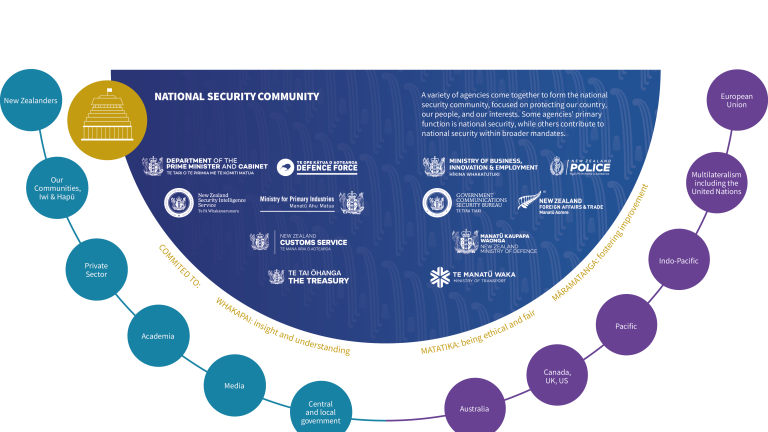“National security” is about protecting New Zealand from threats that would do us harm. The National Security Community prioritises acting early to prevent threats and build New Zealand’s resilience.
Agencies bring together a range of tools—diplomacy, defence, intelligence, law enforcement, and more—to protect and promote New Zealand’s national security interests.
Their work includes understanding the nature of national security issues and their implication for New Zealand; efforts to shape, influence, and in the best cases, preventing threats from manifesting; and preparation to build resilience and readiness, to be able to respond effectively when required. Across all these activities, working together with New Zealand society and international partners is critical to address our most pressing national security issues.
Agencies in the National Security Community
A variety of agencies come together to form the national security community, focused on protecting our country, our people, and our interests. Some agency's primary function is national security, while others contribute to national security within broader mandates.
- Department of the Prime Minister and Cabinet
- Defence Force
- New Zealand Security Intelligence Service
- Ministry for Primary Industries
- New Zealand Customs Service
- The Treasury
- Ministry of Business, Innovation and Employment
- New Zealand Police
- Government Communications Security Bureau
- New Zealand Foreign Affairs and Trade
- New Zealand Ministry of Defence
- Ministry of Transport
There are additional agencies that play an important role in contributing to national security. These agencies include the Ministry of Justice, the Department of Internal Affairs, the Ministry of Health, the Ministry for the Environment, the Ministry of Social Development, the National Emergency Management Agency, New Zealand Search and Rescue, the Civil Aviation Authority, Fire and Emergency New Zealand, Corrections, and more.

